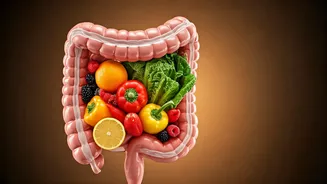Embrace Dietary Changes
The cornerstone of managing gas and bloating often lies in what you eat. Starting with dietary modifications is crucial. Consider reducing your intake
of foods known to trigger gas production. These often include beans, lentils, broccoli, cabbage, and carbonated beverages. Simultaneously, increase your consumption of easily digestible foods like cooked vegetables, lean proteins, and easily fermentable fibers. These fibers help promote beneficial gut bacteria. Introduce these changes gradually to allow your digestive system to adapt. Moreover, paying attention to portion sizes and meal frequency may also assist in lessening bloating. By consciously choosing your foods and eating habits, you can take control of your gut health and enjoy a more comfortable experience.
Hydrate Intelligently
Water is essential, but timing and method matter when addressing bloating. Drinking enough water throughout the day can assist in promoting smooth digestion and prevent constipation, a common cause of bloating. Aim for a consistent intake of water, avoiding large volumes all at once. Drinking water before meals can help regulate your appetite and digestion. In contrast, limiting fluid intake during meals can help to prevent over-dilution of digestive juices, which potentially interferes with efficient nutrient absorption. Instead, sip water between meals. Moreover, staying away from sugary drinks and artificial sweeteners, which can exacerbate bloating, is a crucial step towards your goal of promoting comfortable digestion.
Herbal Teas for Relief
Nature has provided numerous herbs with properties that can alleviate digestive discomfort. Peppermint tea is known for its ability to relax the muscles of the digestive tract, aiding in gas relief. Ginger tea is also a beneficial choice, as it has anti-inflammatory properties, reducing gut inflammation and easing bloating. Chamomile tea offers calming effects, which can help relax the body and mind, indirectly aiding digestion. In addition to these, fennel tea can decrease bloating and support digestive function. Making herbal teas a part of your daily routine can provide a soothing effect and aid in alleviating gas and bloating. Remember to drink these teas moderately, and always check with a healthcare professional before including them in your diet if you have any pre-existing medical conditions.
Mindful Eating Habits
How you eat is as important as what you eat. Adopting mindful eating habits is essential for reducing bloating. Start by eating slowly and chewing your food thoroughly. This helps break down food into smaller particles, making it easier for your body to digest, therefore diminishing the chances of gas production. Avoid talking while eating to prevent swallowing excess air, which can contribute to bloating. Pay attention to your body's hunger and fullness cues, and stop eating when you feel satisfied, not overly full. The use of smaller plates can help control portion sizes, contributing to balanced eating. Practice mindful eating strategies will not only help reduce bloating but will also promote a more positive and healthy relationship with food.
Probiotics' Digestive Role
Probiotics, the beneficial bacteria, play an important role in maintaining a healthy gut. Including probiotic-rich foods or supplements can help balance the gut microbiome, which can significantly reduce bloating. Probiotic-rich foods include yogurt with live cultures, kefir, kimchi, sauerkraut, and kombucha. These foods introduce beneficial bacteria to the gut, aiding digestion and reducing gas. You can also explore probiotic supplements, but choosing a suitable one with the correct strains is important. Start with a low dose and increase gradually to monitor your body's response. A balanced gut microbiome enhances overall digestive health, improving the regularity of bowel movements, and reducing bloating. If you have pre-existing medical conditions, seeking advice from a healthcare professional before starting probiotic supplements is a great idea.
Prioritize Regular Exercise
Regular physical activity is vital not only for general health but also for maintaining a well-functioning digestive system. Exercise promotes regular bowel movements, preventing the buildup of gas and constipation, which often lead to bloating. Even simple activities like walking, jogging, or cycling can help stimulate the digestive tract. Include exercise in your daily or weekly routine. Start with short durations and increase them gradually. Exercise also helps decrease stress levels, which can also influence the digestive system. Choose activities that you enjoy to boost your motivation. Incorporating exercise into your routine will not only help reduce bloating but also improve your overall physical and mental well-being.
Stress Management Techniques
Stress and bloating often have a close relationship. Managing stress is important to relieve digestive distress. When you are stressed, your body produces hormones that can disrupt your digestive system, leading to bloating. Practices like yoga, meditation, and deep breathing exercises can help lower stress levels and improve digestion. Engaging in hobbies you enjoy, spending time in nature, or connecting with loved ones are also effective ways to manage stress. Consider setting aside time each day for relaxation and mindfulness. If stress is a significant concern, you may want to seek help from a therapist or counselor. Implementing stress management techniques will not only help to alleviate bloating but also contribute to an overall sense of well-being.




















